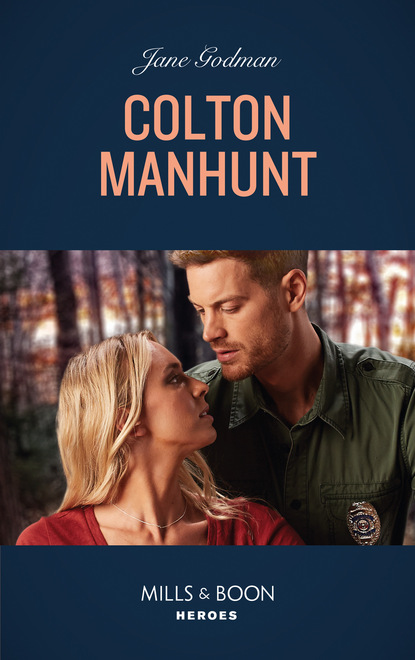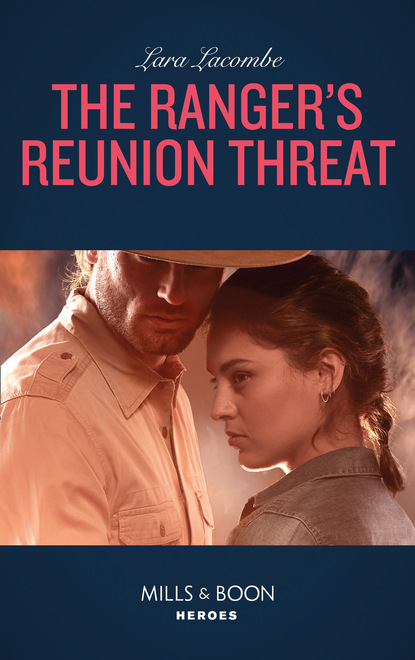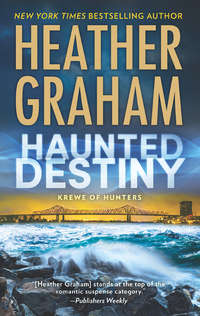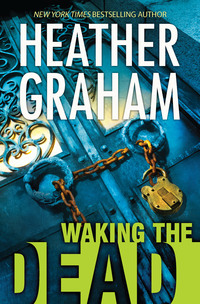
Полная версия
Tangled Threat
“What?” she demanded. “Why not? Mom, Dad—I’m about to leave home. Go to college, really be on my own. I love you. I’m going to come home. But...I’m almost eighteen. I won’t go without seeing Brock.”
Her father, a gentle giant with broad shoulders and a mane of white hair, spoke to her softly. “Sweetheart, we didn’t say that we wouldn’t let you see Brock. We’re saying that you can’t see Brock.” He hesitated, looking over at her mother, and then he continued with, “I’m so sorry. Brock was arrested last night. He was charged with the murder of Francine Renault.”
And with those words, it seemed that her world fell apart, that what she had known, that what she had believed in, all just exploded into a sea of red and then disappeared into smoke and fog.
Chapter One
“I’m assigned to go back to Florida. To stay at the Frampton Ranch and Resort—and investigate what we believe to be three kidnappings and a murder. And the kidnappings may have nothing to do with the resort, nor may the murder?” Brock McGovern asked, a small note of incredulity slipping into his voice, which was surprising to him—he was always careful to keep an even tone.
FBI Assistant Director Richard Egan had brought him into his office, and Brock had known he was going on assignment—he just hadn’t expected this.
“Yes, not what you’d want, but, hey, maybe it’ll be good for you—and perhaps necessary now, when time is of the essence and there is no one out there who could know the place or the circumstances with the same scope and experience you have,” Egan told him. “Three young women have disappeared from the area. Two of them were guests of the Frampton Ranch and Resort shortly before their disappearances—the third had left St. Augustine and was on her way there. The Florida Department of Law Enforcement has naturally been there already. They asked for federal help on this. Shades of the past haunt them—they don’t want any more unsolved murders—and everyone is hoping against hope that Lily Sylvester, Amy Bonham and Lydia Merkel might be found.”
“These are Florida missing persons cases,” Brock said. “And it’s sad but true that young people go to Florida and get caught up in the beach life and the club scene. And regrettable but true once again—there’s a drug and alcohol culture that does exist and people get caught up in it. Not just in Florida, of course, but...everywhere.” He smiled grimly. “I go where I’m told, but I’m curious—how is this an FBI affair? And forgive me, but FBI out of New York?”
“Not out of New York. FDLE asked for you. Specifically.”
“I see.”
Egan didn’t often dwell on the emotional or psychological, but the assistant director hesitated and then said, “You could put your past to rest.”
Brock shrugged. “You know, one of the cooks committed suicide not long after the murder. Peter Moore. He stabbed himself with a butcher knife. He’d had a lot of fights with Francine Renault—the victim found at the tree. They suspected he might have killed himself out of remorse.”
Egan offered him a dry grimace. “I know about the cook, of course. You know me—I knew everything about you on paper before I took you into this unit. I’m not sure anyone would have made a case against him in court. That’s all beside the point—the past may well be the past. But there’s the now, as well. They’re afraid of a serial killer, Brock,” Egan said. And he continued with, “The badly decomposed remains—mostly bones—of another young woman who went missing several months ago were recently found in a bizarre way—they were dumped in with sheets from several hotels and resorts at an industrial laundry that accepted linens from dozens of places—Frampton Ranch and Resort being one of them.”
“I see,” Brock said.
He didn’t really see.
That didn’t matter; Egan would be thorough.
“Yes, this may be a bit hard on you, but you’re the one in the know. To come close to a knowledge of the area and people that you already have might take someone else hours or days that may cost a life... You’re the best man for this. Especially because you were once falsely accused. And, I believe, you may just solve something of the mystery of the past. And quit hating your own home.”
“I don’t hate my own home. Ah, come on, sir, I don’t want to play any cure-me psychological games with this,” Brock said.
Egan shook his head and leaned forward, his eyes narrowed—indicating a rise in his temper, something always kept in check. “If I thought you needed to be cured, you wouldn’t be in my unit. Women are missing. They might be dead already,” he said curtly. “And then again, they might have a chance. You’re the agent with a real sense for the place, the people and the surrounding landscape. And you’re a good agent, period. I trust in your ability to get this sorted.”
Brock greatly admired Egan. He had a nose for sending the right agent or agents in for a job. Usually.
But Brock was sitting across from Egan in Egan’s office—in New York City. He, Brock, was an NYC agent.
And while Brock really didn’t dislike where he came from—he still loved Florida, especially his family home in the Keys—he had opted to apply to the New York office of the Bureau specifically because it was far, far away from the state of his birth.
The New York City office didn’t usually handle events in Florida, unless a criminal had traveled from New York down to the southern state. Florida had several field offices—including a multimillion-dollar state-of-the-art facility in Broward County. That was south—but Orlando had an exceptional office, close enough to the Frampton place. And there were more offices, as well.
Even if the Frampton Ranch and Resort was in a relatively isolated part of the state, a problem there would generally be handled by a more local office.
“Frampton Ranch and Resort,” he heard himself say. And this time, years of training and experience kicked in—his voice was perfectly level and emotionless.
It was true: he sure as hell knew it and the area. The resort was just a bit off from—or maybe part of—what people considered to be the northern Ocala region, where prime acreage was still available at reasonable prices, where horse ranches were common upon the ever-so-slightly rolling hills and life tended to be slow and easy.
There were vast tracts of grazing ground and great live-oak forests and trails laden with pines where the sun seemed to drip down through great strands of weeping moss that hung from many a branch. It could be considered horse country, farm country and ranch county. There were marshes and forests, sinkholes and all manner of places where a body might just disappear.
The Frampton ranch was north of Ocala, east of Gainesville and about forty-five minutes south of Olustee, Florida, where every year, a battle reenactment took place, drawing tourists and historians from near and far. The Battle of Olustee, won by forces in the state; the war had been heading toward its final inevitable conclusion, and then time proved that victory had been necessary for human rights and the strength and growth of the fledgling nation, however purposeless the sad loss of lives always seemed.
Reenactors and historians arrived in good numbers, and those who loved bringing history to life also loved bringing in crowds and many came for the campgrounds. The reenactment took place in February, when temperatures in the state tended to be beautiful and mosquito repellent wasn’t as much a requirement as usual. During the winter season—often spring break for other regions—the area was exceptionally popular.
The area was beautiful.
And the large areas of isolation, which included the Frampton property, could conceal any number of dark deeds.
He’d just never thought he’d go back to it.
Certainly, time—and the path he had chosen to take in life—had helped erase the horror of the night they had come upon the body of Francine Renault hanging from the History Tree and his own subsequent arrest. He’d been so young then, so assured that truth spoke for itself. In the end, his parents—bless them—had leaped to the fore, flying into action, and their attorney had made quick work of getting him out of jail after only one night and seeing that his record was returned to spotless. It was ludicrous that they had arrested him; he’d been able to prove that it would have been impossible for him to have carried out the deed. Dozens of witnesses had attested to the fact that he couldn’t have been the killer, he’d been seen by so many people during the hours in which the murder must have taken place. He could remember, though, sitting in the cell—cold, stark, barren—and wondering why in God’s name they had arrested him.
He discovered that there had been an anonymous call to the station—someone stating that they had seen him dragging Francine Renault into the woods. The tipster had sworn that he would appear at a trial as a witness for the prosecution, but the witness had not come to the station. Others had signed formal protests, and the McGoverns’ attorney had taken over.
So many people had come forward, indignant, furious over his arrest.
But not Maura. She had been gone. Just gone. He couldn’t think of the Frampton Ranch and Resort without a twinge of pain. He had never been sure which had broken him more at the time—the arrest or the fact that Maura had disappeared as cleanly from his life as any hint of daylight once night had fallen.
They had been so young. It had been natural that her parents whisked her away, and maybe even natural that neither had since tried to reach the other.
But there were times when he could still close his eyes and see her smile and be certain that he breathed in the subtle scent of her. Twelve years had gone by; he wasn’t even the same person.
Egan was unaware of his reflections.
“Detective Michael Flannery is lead investigator now. He was on the case when you were arrested for the crime, but he wasn’t lead.”
“I know Flannery. We’ve communicated through the years, believe it or not. I almost feel bad—he suffered a lot of guilt about jumping the gun with me.”
“He’s with the Florida Department of Law Enforcement now, with some seniority and juice, so it seems,” Egan informed him. “Years ago, when the murder took place, the federal government wasn’t involved. Flannery doesn’t want this crime going unsolved. He knows you’re in this office now. His commander told me that he keeps in touch with you.” Egan paused. “It doesn’t sound as if you have a problem with him—you don’t, right?”
“No, sir, I do not.”
Even as a stunned kid—what he had been back then—Brock had never hated Detective Flannery for being one of the men who had come and arrested him.
Flannery had been just as quick to listen to the arguments that eventually cleared Brock completely of any wrongdoing. While Brock knew that Flannery was furious that he had been taken and certain that there had been an underlying and devious conspiracy to lead him and his superiors so thoroughly in the wrong direction, he had to agree that, at the time, Brock had appeared to be a ready suspect.
He’d had a fight with Francine that day, and it had been witnessed by many people. He hadn’t gotten physical in any way, but his poor opinion of her, and his anger with her, had probably been more than evident—enough for him to be brought in for questioning and to be held for twenty-four hours at any rate.
“I’m curious how something that happened so long ago can relate to the cases happening now,” Brock said.
“It may not. The remains of the dead girl found in the laundry might have been the work of one crazed individual or an acquaintance seeking vengeance, acting out of jealousy—a solitary motive. It might be coincidence the way she was found—or maybe a killer was trying to throw suspicion upon a particular place or person. But...a lot of the same individuals are still there now who were there when Francine Renault was killed.”
“Donald Glass—he’s around a lot, though he does spend time at his other properties. Fred Bentley—I imagine he’s still running the works. Who else is still there?” Brock asked.
Egan handed him a pile of folders. “All this is coming to your email, as well. There you have those who are in residence—and dossiers on the victims. Yes, Glass and Bentley are still on the property. There are other staff members who never left—Millie Cranston, head of Housekeeping. Vinnie Marshall, upgraded to chef—after Peter Moore’s death, I might add. And then...” He paused, tapping the folders. “You have some old guests who are now employees.”
“Who?”
“Mark and Nils Hartford,” Egan told him. “Both of them report directly to Fred Bentley. Mark has taken over as the social director. Nils is managing the restaurants—the sit-down Ranch Roost and the Java Bar.”
Brock hadn’t known that the Hartford brothers—who’d seemed so above the working class when they’d been guests—were now employed at the very place where they had once loved to make hell for others.
“Flannery said this is something he hadn’t mentioned to you. One of your old friends—or acquaintances—Rachel Lawrence is now with FDLE. She’s been working the murder and the disappearances with him.”
“Rachel? Became...a cop?” Brock shook his head, not sure if he was angry or amused. Rachel had never wanted to break a nail. She’d been pretty and delicate and... She’d also been a constant accessory of Nils Hartford.
“I guess your old friend Flannery was afraid to tell you.”
“I don’t know why he would be. I’m just a little surprised—she seemed more likely to be on one of those shows about rich housewives in a big city, but I never had a problem with her. That the Hartford brothers both became employees—that’s also a surprise. They made me think of Dirty Dancing. They were the rich kids—we were the menial labor. But the world changes. People change.”
“Flannery’s point, so it appears, is that a number of the same players are in the area—may mean something and may not. There have been, give or take, approximately a thousand murders in the state per year in the last years. But that’s only about four percent per the population. Still, anything could have happened. Violent crime may have to do with many factors—often family related, gang related, drug related, well...you know all the drills. But if we do have a serial situation down there—relating to or not relating to the past—everyone needs to move quickly. Not only do you know the area and the terrain, you know people and you know the ropes of getting around many of the people and places who might be integral to the situation.”
“Yes. And any agent would want to put a halt to this—put an end to a serial killer. Or find the girls—alive, one can pray—or stop future abductions and killings.”
Egan nodded grimly and tossed a small pile of photos down before him. Brock could see three young, hopeful faces looking back at him. All three were attractive, and more grippingly, all three seemed to smile with life and all that lay before someone at that tender age.
“The missing,” Egan said. He had big hands and long fingers. He used them to slide the first three photographs over.
The last was a divided sheet. On one side was the likeness of a beautiful young woman, probably in her early twenties. Her hair had been thick and dark and curly; her eyes had been sky blue. Her smile had been engaging.
“Maureen Rodriguez,” Egan said. He added softly, “Then and now.”
On the other side of the divided sheet was a crime scene photo—an image of bones, scattered in dirt in a pile of sheets. In the center of the broken and fragmented bones was a skull.
The skull retained bits of flesh.
“According to the investigation, she was on her way to Frampton Ranch and Resort,” Egan said.
Brock nodded slowly and rose. “As am I,” he said. “When do I leave?”
“Your plane is in two hours—down to Jacksonville. You’ve a rental car in your name when you arrive. I’m sure you know the way to the property. Detective Flannery will be waiting to hear from you. He’ll go over all the particulars.”
Brock was surprised to see that Egan was still studying him. “You are good, right?” he asked Brock.
“Hey, everyone wants to head to Florida for the winter, don’t they?” he asked. “I’m good,” he said seriously. “Maybe you’re right. Maybe we can put the past to rest after all.”
* * *
“I LOVE IT—just love it, love it, love it! Love it all!” Angie Parsons said enthusiastically. She offered Maura one of her biggest, happiest smiles.
She was staring at the History Tree, her smile brilliant and her enthusiasm for her project showing in the brightness of her eyes and her every movement. “I mean, people say Florida has no history—just because it’s not New England and there were no pilgrims. But, hey, St. Augustine is—what?—the oldest settlement continually...settled...by Europeans in the country, right? I mean, way back, the Spaniards were here. No, no, the state wasn’t one of the original thirteen colonies. No, no Puritans here. But! There’s so much! And this tree... No one knows how old the frigging oak is or when the palm tree grew in it or through it or with it or whatever.”
Angie Parsons was cute, friendly, bright and sometimes, but just sometimes, too much. At five feet two inches, she exuded enough energy for a giant. She had just turned thirty—and done brilliantly for her years. She had written one of the one most successful nonfiction book series on the market. And all because she got as excited as she did about objects and places and things—such as the History Tree.
The main tree was a black oak; no one knew quite how old it was, but several hundred years at least. That type of oak was known to live over five hundred years.
A palm tree had—at some time—managed to grow at the same place, through the outstretched roots of the oak and twirling up around the trunk and through the branches. It was bizarre, beautiful, and so unusual that it naturally inspired all manner of legends, some of those legends based on truth.
And, of course, the History Tree held just the kind of legend that made Angie as successful as she was.
Angie’s being incredibly successful didn’t hurt Maura any.
But being here... Yes, it hurt. At least...it was incredibly uncomfortable. On the one hand it was wonderful seeing people she had worked with once upon a time in another life.
On the other hand it was bizarre. Like visiting a mirror dimension made up of things she remembered. The Hartford brothers were working there now. Nils was managing the restaurants—he’d arrived at the table she and Angie had shared last night to welcome them and pick up their dinner check. Of course, Nils had become management. No lowly posts for him. He seemed to have an excellent working relationship with Fred Bentley, who was still the manager of the resort. Bentley had come down when they’d checked in—he’d greeted Maura with a serious hug. She was tall, granted, and in heels, and he was on the short side for a man—about five-ten—but it still seemed that his hug allowed for him to rest his head against her breasts a moment too long.
But still, he’d apparently been delighted to see her.
And Mark Hartford had come to see her, too, grown-up, cute and charming now—and just as happy as his brother to see her. It was thanks to her, he had told her, and her ability to tell the campfire histories, that had made him long to someday do the same.
The past didn’t seem like any kind of a boulder around his neck. Certainly he remembered the night that Francine had been murdered.
The night that had turned her life upside down had been over twelve years ago.
Like all else in the past, it was now history.
Time had marched on, apparently, for them—and her.
She’d just turned eighteen the last time she had been here. When that autumn had come around, she’d done what she’d been meant to do, headed to the University of Central Florida, an amazing place to study performance of any kind and directing and film—with so many aspects thrown into the complete education.
She’d spent every waking minute in classes—taking elective upon elective to stay busy. She was now CEO of her own company, providing short videos to promote writers, artists, musicians and anyone wanting video content, including attorneys and accountants.
Not quite thirty, she could be proud of her professional accomplishments—she had garnered a great reputation.
She enjoyed working with Angie. The writer was fun, and there was good reason for her success. She loved the bizarre and spooky that drew human curiosity. Even those who claimed they didn’t believe in anything even remotely paranormal seemed to love Angie’s books.
Most of the time, yes, Maura did truly enjoy working with Angie, and since Angie had tried doing her own videos without much success, she was equally happy to be working with Maura. They’d done great bits down in Key West at the cemetery there—where Maura’s favorite tomb was engraved with the words I told you I was sick!—and at the East Martello Museum with Robert the Doll. They had filmed on the west coast at the old summer estates that had belonged to Henry Ford and Thomas Edison. And they’d worked together in St. Augustine, where they’d created twenty little video bits for social media that had pleased Angie to no end—and garnered hundreds of thousands of hits.
Last night, even Marie Glass—Donald’s reserved and elegant wife—had come by their dinner table to welcome them and tell them just how much she enjoyed all the videos that Maura had done for and with Angie, telling great legends and wild tales that were bizarrely wonderful—and true.
Maybe naturally, since they were working in Florida, Angie had determined that they had to stay at Frampton Ranch and Resort and film at the History Tree.
Maura had suggested other places that would make great content for a book on the bizarre: sinkholes, a road where cars slid uphill instead of downhill—hell, she would have done her best to make a giant ball of twine sound fascinating. There were lots of other places in the state with strange stories—lord! They could go back to Key West and film a piece on Carl Tanzler, who had slept with the corpse of his beloved, Elena de Hoyos, for seven years.
But Angie was dead set on seeing the History Tree, and when they’d gotten to the clearing she had started spinning around like a delighted child.
She stopped suddenly, staring at Maura.
“You really are uncomfortable here, aren’t you? Scared? You know, I’ve told you—you can hire an assistant. Maybe a strapping fellow, tall, dark and handsome—or blond and handsome—and muscle-bound. Someone to protect us if the bogeyman is around at any of our strange sites.” Angie paused, grinning. She liked men and didn’t apologize for it. In her own words, if you didn’t kiss a bunch of frogs, you were never going to find a prince.
“Angie, I like doing my own work—and editing it and assuring that I like what I’ve done. I promise you, if we turn something into any kind of a feature film, we’ll hire dozens of people.”
Angie sighed. “Well, so much for tall, dark—or blond—and handsome. Your loss, my dear friend. Anyway. You do amazing work for me. You’re a one-woman godsend.”
“Thanks,” Maura told her. She inhaled a deep breath.
“Could you try not to look quite so miserable?”
“Oh, Angie. I’m sorry. It’s just...”
“The legend. The legend about the tree—oh, yes. And the murder victims found here. I’m sorry, Maura, but... I mean, I film these places because they have legends attached to them.” Angie seemed to be perplexed. She sighed. “Of course, the one murder was just twelve years ago. Does that bother you?” Staring at Maura, she gasped suddenly. “You’re close to this somehow, right? Oh, my God! Were you one of the kids working here that summer? I mean, I’d have had no idea... You’re from West Palm Beach. There’s so much stuff down there. Ah!” It seemed that Angie didn’t really need answers. “You wound up going to the University of Central Florida. You were near here...”














